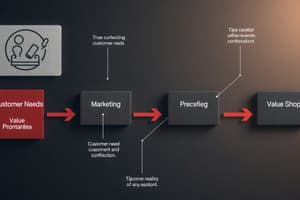Podcast
Questions and Answers
What are some methods used to conduct market research?
What are some methods used to conduct market research?
Surveys, focus groups, interviews, observation, and secondary data sources.
What is the purpose of market research in the marketing process?
What is the purpose of market research in the marketing process?
To gain insights into consumer behavior, preferences, and trends.
What is included in a marketing strategy?
What is included in a marketing strategy?
Target audiences, unique selling propositions, competitive advantages, and brand image.
How does a marketing strategy help businesses?
How does a marketing strategy help businesses?
What role does brand image play in a marketing strategy?
What role does brand image play in a marketing strategy?
What is the significance of competitive advantages in a marketing strategy?
What is the significance of competitive advantages in a marketing strategy?
What is the purpose of a marketing strategy?
What is the purpose of a marketing strategy?
Define product positioning in the context of marketing strategy.
Define product positioning in the context of marketing strategy.
What role does pricing play in influencing consumer perceptions?
What role does pricing play in influencing consumer perceptions?
Name two pricing strategies that businesses may choose from and briefly explain their focus.
Name two pricing strategies that businesses may choose from and briefly explain their focus.
What is promotion planning focused on in marketing strategy?
What is promotion planning focused on in marketing strategy?
Explain the importance of sales forecasting in a marketing strategy.
Explain the importance of sales forecasting in a marketing strategy.
Flashcards are hidden until you start studying
Study Notes
Marketing Process Overview
The marketing process is a systematic approach to identifying, anticipating, and satisfying customer needs and wants through the creation, promotion, and distribution of goods, services, ideas, or experiences. It involves several key stages that work together to ensure successful marketing outcomes, including market research, marketing strategy development, target audience identification, product positioning, pricing, promotion planning, sales forecasting, and performance evaluation. Let's explore each stage in detail and its role within the overall marketing process.
Market Research
Market research is the first step in the marketing process, involving collecting, analyzing, and interpreting information about potential customers, competitors, and markets. This stage helps businesses gain insights into consumer behavior, preferences, and trends, enabling them to make informed decisions about their products, services, and marketing tactics. Market research can be conducted through various methods such as surveys, focus groups, interviews, observation, and secondary data sources like industry reports and government statistics.
Marketing Strategy Development
Based on the findings from market research, businesses develop a marketing strategy to guide their actions and achieve specific objectives. A marketing strategy includes elements like target audiences, unique selling propositions, competitive advantages, and brand image. By outlining how a company intends to reach its goals, the marketing strategy serves as a roadmap for all subsequent activities, ensuring that resources are allocated effectively and efforts are aligned with business objectives.
Product Positioning
Product positioning refers to how a company makes its offering attractive to customers by highlighting its benefits relative to competitors. It involves determining where a product fits within the broader market landscape and what competitive advantage it offers over other options. By understanding how a product compares to others in terms of features, price, convenience, and other factors, businesses can position their offerings in a way that resonates with consumers and differentiates them from competing brands.
Pricing
Pricing strategies determine the cost of a product or service, which plays a significant role in influencing consumers' perceptions of value and affordability. Businesses may choose between different pricing tactics based on their goals, such as penetration pricing (lower initial prices to attract customers), skimming pricing (higher initial prices to maximize profits), psychology pricing (using rounded numbers to impact consumer perception), and value-based pricing (setting prices based on perceived value). Ultimately, the chosen pricing strategy aims to balance profitability, competitiveness, and meeting customer expectations.
Promotion Planning
Promotion planning focuses on creating and executing communication strategies to promote a product or service. Advertising, public relations, personal selling, events and exhibitions, direct mail, e-mail, social media, and other promotional tools are used to create awareness, generate interest, and influence buying decisions. Effective promotion requires a well-defined target audience, clear messaging, appropriate channels, and timely execution to ensure maximum impact on customer behavior.
Sales Forecasting
Sales forecasting is the process of estimating future sales volumes, revenues, and profitability to help businesses make better decisions about inventory management, production capacity, staffing, and financial projections. Factors affecting sales forecasting include economic conditions, competition, marketing efforts, seasonality, and historical sales data. Accurate sales forecasting enables companies to optimize operations, manage cash flow, and plan strategically for growth opportunities.
Performance Evaluation
Performance evaluation is the final stage of the marketing process, assessing the effectiveness of marketing initiatives against predetermined goals and objectives. Key performance indicators (KPIs) such as return on investment (ROI), customer satisfaction, market share, and revenue growth are measured to gauge the success of marketing strategies. Based on these evaluations, businesses can adjust their approaches accordingly, continuously improving their marketing processes and achieving better results over time.
Studying That Suits You
Use AI to generate personalized quizzes and flashcards to suit your learning preferences.




